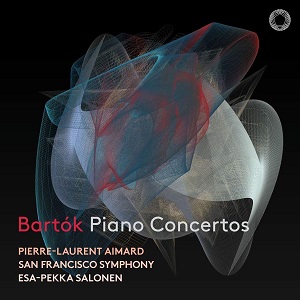
Bela Bartók (1881-1945)
Piano Concerto No 1 in A major, Sz. 83 (1926)
Piano Concerto No 2 in G major, Sz. 95 (1931)
Piano Concerto No 3 in E major, Sz. 119 (1945)
Pierre-Laurent Aimard (piano)
San Francisco Symphony/Esa-Pekka Salonen
rec. live, 16-19 June 2022, 17-19 February 2023, Davies Symphony Hall, War Memorial & Performing Arts Center, San Francisco
Pentatone PTC5187029 [80]
Bartók’s three piano concertos fit neatly onto one disc, but they are very different from one another. The first belongs to the period of the ballet The Miraculous Mandarin, the Piano Sonata and the third String Quartet. It is an uncompromisingly fierce, dissonant and aggressive work, in which Bartók carried out his plan to emphasize the piano as a percussion instrument. The second is almost equally dissonant but is mainly exuberant and high-spirited. It came between the fourth and fifth String Quartets, and when Bartók was making a number of folksong arrangements. The third concerto is practically Bartók’s last work: there remained only the Viola Concerto, which he did not live to complete, and indeed the last few bars of the Piano Concerto had to be orchestrated by Tibor Serly. It is a far cry from the earlier two concertos, and by this time Bartók had simplified his idiom; it is the period of the sixth String Quartet and the Concerto for Orchestra. However, all three are masterpieces and classics of the genre.
Most pianists who play these concertos play and record all three. However, there are exceptions: Maurizio Pollini recorded only the first two, Martha Argerich only the third, and Boulez recorded all three with a different pianist for each one. Here we have Pierre-Laurent Aimard in all three, with Esa-Pekka Salonen conducting. Aimard has recorded some Bartók before, notably the two Violin Sonatas. I have not heard these, but I know from his recordings of Ives, Messiaen and Ligeti that he is a redoubtable exponent of twentieth century piano music of the more adventurous kind. Salonen is also at home with the idiom and has recorded a fair amount of Bartók already. I am not among those who think that players of the same nationality as the composer have an advantage over others, so I see no problem in a French pianist, a Finnish conductor and an American orchestra playing the work of a Hungarian composer. I was sure I was in safe hands.
And so indeed I am, but with a qualification. By any criterion, these performances are good. The pianist has the measure of all three works, different from one another though they are, and the orchestra plays with splendid precision, particularly to be admired in the first concerto, where their part is notoriously challenging. However, it was in this first concerto where I felt something was lacking. I put on two of my old favourites, Géza Anda with Ference Fricsay, a classic recording dating from 1961 but sounding splendid in the latest DG transfer, and Zoltán Kocsis with Ivan Fischer, dating from 1984, and in both of these there was the sense of menace, of tension and suspense that I felt was lacking in Aimard’s performance.
The other two performances, however, I felt were splendid. In the second concerto I particularly admired the middle movement, with its opening on slow strings – which were silent in the first movement – and the fast toccata-like middle section generated exactly the right kind of excitement.
The third concerto is more different from the other two than they are from each other. It is mainly serene and graceful, remarkably so when one considers that it was written in wartime, in exile and when Bartók knew he did not have long to live. It is believed that he wrote it for his wife Ditta to play after his death, and she did indeed play and later record it. Listening to it, I wonder whether Bartók had been remembering Beethoven’s fourth Piano Concerto, as his work has something of the same serenity. And some of the piano writing in the slow movement reminds me of that in Ravel’s G major concerto. Aimard, slightly to my surprise, provides beautifully elegant phrasing and articulation and shows himself as much at home in the graceful writing here as he did in the much more challenging writing in the first two concertos.
So, I think we have one good performance and two superb ones. If the first concerto had been as satisfactory as the other two, this would have been a candidate for one of my records of the year. As it is, the disc as a whole is certainly good and others may disagree with me about that first concerto. The recording is impeccable.
Stephen Barber
Help us financially by purchasing from





















